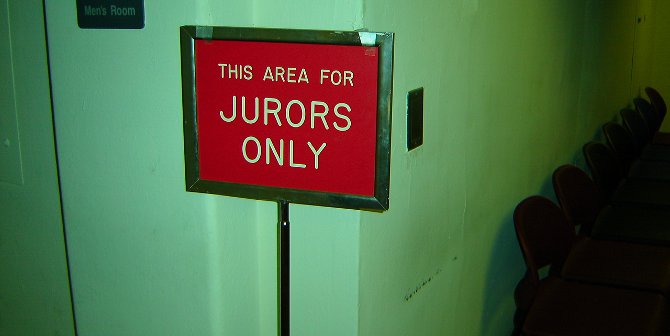 Tennessee has a relatively high incarceration rate compared to other American states, with African Americans disproportionately represented in the state’s jails. Gerald K. Fosten writes that conservative rhetoric and fear mongering about African Americans combines with the lobbying of legislators by private prison providers motivated by profit to increasingly send African Americans to prison even at a time of falling crime rates.
Tennessee has a relatively high incarceration rate compared to other American states, with African Americans disproportionately represented in the state’s jails. Gerald K. Fosten writes that conservative rhetoric and fear mongering about African Americans combines with the lobbying of legislators by private prison providers motivated by profit to increasingly send African Americans to prison even at a time of falling crime rates.
In a nation that ranks first in the world for locking up its citizens, Tennessee ranks tenth among the 50 states in incarceration rates. In 2014, for example, according to Tennessee Department of Corrections (TNDOC), Tennessee had nearly 30,000 of its citizens in prisons and jails, and 71,000 people under the supervision of the criminal justice system. African American males made up less than eight percent of Tennessee’s total population, but represented 44 percent of those incarcerated.
So why does the Volunteer State have such a rate of African-American incarceration? Tennessee is a good example for examining ethically questionable public-private business relationship arrangements and how the criminal justice system intentionally or unintentionally impacts political, economic and social outcomes. The state has constructed an elaborate correctional industrial complex over the past several decades. Ethically questionable public-private business relationship arrangements are continuously devised and implemented to engineer advantageous political, economic and social conditions that enable conservatives and whites supremacists’ continual domination in the state.
Profit-seeking motives and other forms of economic incentives contribute to policy racism in Tennessee’s criminal justice system. Some policymakers and taxpayers have asked and critically examined why incarceration rates continue to rise and the state continuously invests more money and resources in the corrections industrial complex when per capita crime rates are in a downward trend.
Conservative rhetoric and the targeting of African Americans
Nineteenth century post-slavery Reconstruction Black Codes laws and twentieth century Jim Crow laws have evolved into post-Civil Rights politicization of crime and the institutionalization of conservatives’ ‘law and order’ policies. Conservative policymakers, media and interest groups repeatedly argue to the American public that the nation is soft on crime. Their rhetoric framing the ‘War on Crime’ and ‘”War on Drugs” as the antidotes to the nations’ major domestic threats in the post-Civil Rights era have been extremely effective. In their rhetoric, African American males are the poster children for crime. As a result, they are systematically and disproportionally targeted by the criminal justice system.
Crime rates and the causes of crime are quite complex issues. Criminologists agree that crime is related to many factors and variables. While incapacitation of criminals through incarceration have some impact on the crime rate, stronger legislation such as ‘Get Tough on Crime,’ ‘The War on Drugs,’ ‘Three Strikes,’ ‘Abolishing Parole,’ etc. are overly simplistic and do nothing to explain the root causes of crime and complex social problems, and are ineffective from economic, fiscal and social cost-benefit analysis approaches.
What constitutes a statistically-measureable crime is a highly subjective process determined by policymakers and passed legislation. What becomes law is determined by legislation passed by policymakers, each with its own unique motivation and interests at stake regarding the passage of a specific legislation. Criminal legislation can be manipulated to serve any combination of political, economic or social agendas. New definitions of what constitute a crime and related classifications of crime are routinely crafted by policymakers, as well as new ways of measuring, collecting and reporting of crime data.
“Cell 13” by ken fager is licensed under CC BY NC SA 2.0
The business of prisons
Privately managed companies use complex business models such as accounting balance sheets, income statements, profit-loss statements, cost and managerial accounting, and other data to analyze and forecast what brings the greatest revenue returns to the many financial investors in the prison industrial complex through the privatization of government correctional services. The correctional industrial complex has evolved to become a mainstream capitalistic segment of Tennessee’s economy and is a continuously self-perpetuating industry in search of new economic markets and profitable revenue streams. Public-sector entrepreneurial government combined with private-sector managerial criminology in Tennessee’s criminal justice system has evolved into a self-perpetuating business model with the goal of continuously generating profitable revenue streams, while simultaneously oppressing minority racial group threats. The industry and affiliated institutions are predatory in nature. African American males and, to a lesser yet growing extent, Latino males unequally serve as cash cows in this economic system.
How legislators voted, and passage of criminal justice system legislation are evidence of unethical public-private business partnerships and arrangements. Many policymakers received donations and campaign contributions from lobbyists and special interest groups. Privately-managed stakeholders partner with government institutions to craft public policy, subsequently acting as de facto institutions contributing to the social engineering of American society. Conservative Arlington, Virginia based American Legislative Exchange Council (ALEC), state legislators, private correctional service providers and suppliers draft bills intended for passage by state legislators and enter into public-private partnership agreements that serve conservatives and white nationalists’ strategic interests, agendas and objectives in Tennessee and other states. During the 2016 Presidential Election, out of Tennessee’s 95 counties, 92 were won by the Republican Party, and three were won by the Democratic Party.
Both Corrections Corporation of America (CCA) and GEO Group, Inc., the two largest operators of private facilities, have been large contributors to ALEC, which lobbies for policies that would increase incarceration, such as ‘three-strikes’ laws and ‘truth-in-sentencing’ legislation, etc. Damon Hininger, CEO of CCA oftentimes informs investors know that keeping bed occupancy rates at sufficient levels are necessary to generating profits. The 2010 Annual Report filed with the Securities and Exchange Commission, CCA, stated: ‘The demand for our facilities and services could be adversely affected by . . . leniency in conviction or parole standards and sentencing practices . . . .’. To be profitable enough to attract investors, private prison firms must guarantee that prison beds are filled. Industry analysts say a 90-95 percent prison bed occupancy rate is needed to guarantee the desired rates of return necessary to attract investors. In 2016, CoreCivic (formerly CCA) opened its new $140-million 2,552-bed maximum security prison in economically distressed Hartsville, Tennessee. Many of CoreCivic’s board of directors and upper leadership are former state government officials and have connections with legislators.
As a consequence, conservatives’ interests and white nationalists’ interests in Tennessee converge in unison to deal with domestic threats to whites’ future political, economic and social dominance. The more revenue privately-run correctional facilities earn is directly correlated to the number of prisoners incarcerated. In capitalistic quests to generate profits by utilizing managerial criminology, privately managed correctional service providers and suppliers have vested interests in seeing to it that the nation and states have and continue to have a criminal class for which to exploit the public’s perception of crime, public safety, law and order, and the privatization of government services.
- This article is based on the paper, ‘Profit-Seeking Motives and Racist Policy in Tennessee’s Criminal Justice System: A Triangulative Analysis’, in the Journal of Black Studies.
Please read our comments policy before commenting.
Note: This article gives the views of the author, and not the position of USAPP– American Politics and Policy, nor of the London School of Economics.
Shortened URL for this post: http://bit.ly/2k80U0W
_________________________________
About the author
 Gerald Fosten – The African Institution
Gerald Fosten – The African Institution
Gerald Fosten is a Research Associate at The African Institution. He completed his PhD in Political Science at Howard University in May 2016 and had previously received his BS and MPA degrees at the College of Public Service and Urban Studies (Institute of Government) at Fisk University and Tennessee State University, respectively. He has spent over 12 years traveling to urban communities studying government policies and inequality.








1 Comments